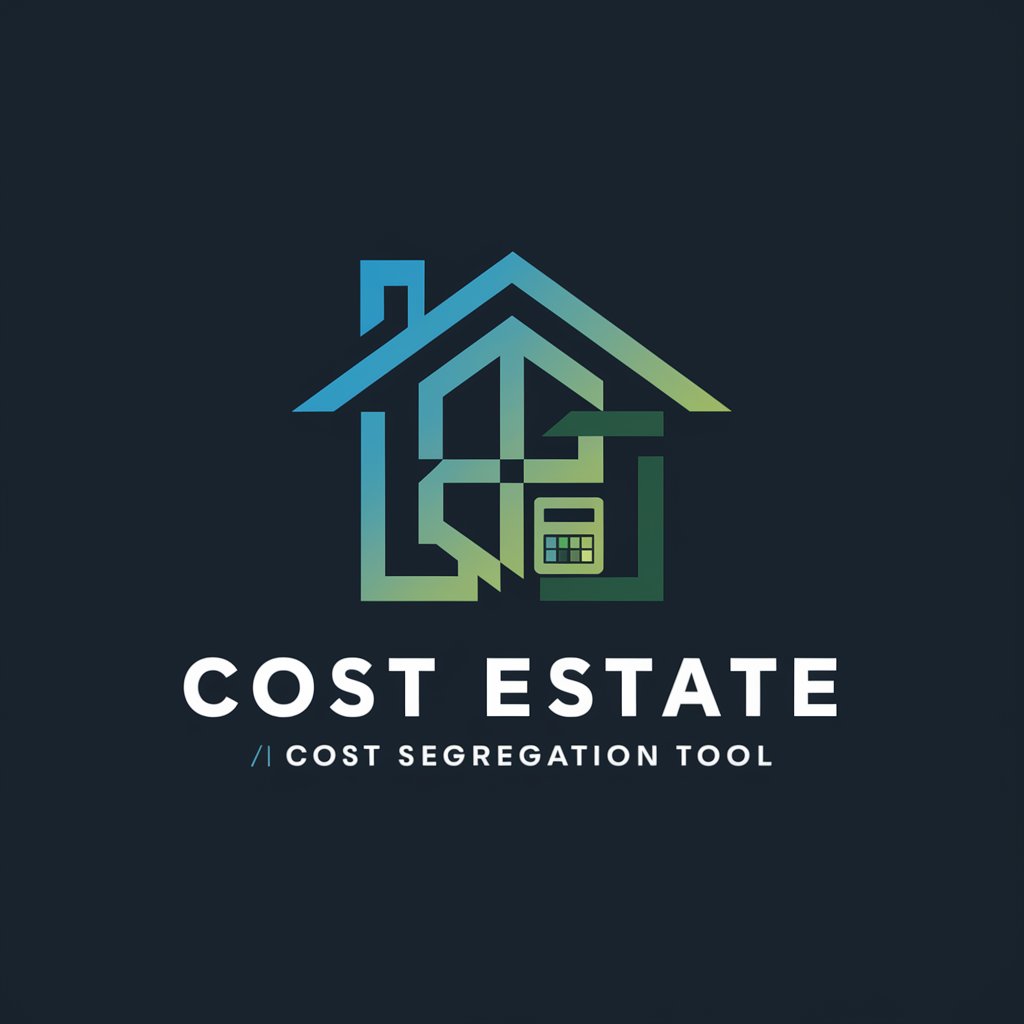
Real Estate Cost Segregation XPT - precise tax depreciation analysis

Welcome to Real Estate Cost Segregation XPT, your expert tool for maximizing property tax benefits.
Accelerate depreciation with AI precision
Analyze the construction costs of a commercial property and categorize them into appropriate asset classes.
Generate a detailed cost segregation report for a newly acquired residential rental property.
Provide insights on the latest IRS guidelines regarding real estate cost segregation.
Create a depreciation schedule that maximizes tax savings for a mixed-use property.
Get Embed Code
Overview of Real Estate Cost Segregation XPT
Real Estate Cost Segregation XPT is designed as an advanced tool specifically for real estate professionals, property owners, and tax experts to conduct cost segregation studies efficiently. The purpose of this specialized tool is to analyze and categorize construction and acquisition costs into different asset categories, such as personal property, land improvements, and building components. This categorization is crucial as it allows for accelerated depreciation claims, thereby reducing tax obligations and improving cash flow. A typical scenario might involve a property owner who has recently acquired a commercial property and uses the XPT to identify and reclassify certain expenditures from real property to personal property, resulting in a shorter depreciation period and significant tax savings. Powered by ChatGPT-4o。

Core Functions of Real Estate Cost Segregation XPT
Detailed Asset Categorization
Example
Categorizing components of a new office building such as lighting fixtures, carpeting, and wall coverings as personal property rather than real property.
Scenario
A real estate company purchases a building intended for lease. The XPT is used to segregate the costs of movable partitions and decorative lighting from the building’s structural components. This reclassification results in the assets being depreciated over 5 years instead of 39 years, enhancing the company's first-year tax deductions.
Depreciation Scheduling
Example
Creating a depreciation schedule that maximizes tax deductions over the asset's useful life.
Scenario
A property owner engages the XPT to generate a depreciation schedule for a newly constructed retail space. Using the XPT, they can depreciate landscaping and exterior improvements over 15 years and signage over 7 years, rather than depreciating the entire cost of the property over 39 years.
Tax Savings Estimation
Example
Estimating potential tax savings for a client by applying cost segregation study findings.
Scenario
An accounting firm uses the XPT to estimate tax savings for a client who has invested in a multifamily housing complex. By reallocating 20% of the property’s purchase price to personal property and land improvements, the XPT calculates a substantial reduction in tax liability over the first five years post-purchase.
Target User Groups for Real Estate Cost Segregation XPT
Property Owners
This includes both commercial and residential property owners who can benefit from detailed cost segregation to accelerate depreciation, lower tax obligations, and improve cash flow. They are primary beneficiaries as they often handle multiple properties and can realize considerable savings.
Real Estate Professionals
Real estate developers, investors, and managers who need to optimize the financial performance of their real estate assets. They utilize the XPT to ensure each property they develop or manage yields the maximum possible tax advantages.
Tax Advisors and Accountants
These professionals use the XPT to provide accurate, IRS-compliant cost segregation reports for their clients, helping them to make well-informed financial decisions based on the most beneficial tax strategies.

How to Use Real Estate Cost Segregation XPT
Begin your trial
Access Real Estate Cost Segregation XPT by visiting yeschat.ai to start a free trial without any login requirement; no ChatGPT Plus subscription is necessary.
Identify your property type
Select the type of property you own or manage, whether commercial, residential, or industrial, to ensure that the tool customizes its analysis accordingly.
Input property details
Enter detailed information about your property, including construction costs, date of acquisition, and any renovations or improvements made.
Analyze segregation report
Utilize the tool to generate a detailed cost segregation report, breaking down the costs into categories such as personal property, land improvements, and building components.
Review tax savings
Examine the depreciation schedules and estimated tax savings that the tool provides to ensure you are maximizing your tax benefits.
Try other advanced and practical GPTs
Cost Seg Pro
Maximize Depreciation with AI

CostSeg Tactician
Maximize your tax benefits with AI-powered cost segregation.

SuperIcon Human Relationship Mentoring
Empowering Relationships with AI

SuperIcon Work Mentoring
Empowering Professionals with AI

SuperIcon Education Mentoring
Elevate Learning with AI

Micul Tovarăș
AI-powered WordPress Development Assistant

I am Bored
Revitalize Your Free Time with AI

Bored No More
Unleash Creativity with AI

Bored GPT
Beat boredom with AI-powered creativity.

Bored AI
Discover Fun, AI-Powered

Bored Pseudo ADHD Buddy
Unleashing creativity with AI-powered whimsy

Tableaux de Bord
Empowering data-driven decisions with AI

Frequently Asked Questions About Real Estate Cost Segregation XPT
What is cost segregation in real estate?
Cost segregation is a strategic tax planning tool that allows property owners to identify and reclassify property components that can be depreciated over a shorter depreciation life (typically personal property or land improvements) rather than building life, thereby accelerating depreciation deductions and reducing tax liability.
How does Real Estate Cost Segregation XPT adhere to IRS guidelines?
The tool is designed to align with IRS guidelines by categorizing property components based on detailed engineering and construction cost data, ensuring compliance with tax laws and audit standards.
Can this tool be used for properties undergoing renovations?
Yes, it is particularly useful for properties undergoing renovations as it can analyze costs associated with the upgrades and segregate them accurately for enhanced tax benefits.
What types of properties can benefit from using Real Estate Cost Segregation XPT?
All types of real properties, including commercial, industrial, and residential properties, can benefit from using this tool by optimizing their depreciation schedules and maximizing tax savings.
How often should a cost segregation study be updated?
A cost segregation study should be updated whenever significant changes are made to the property, such as additions, renovations, or large repairs, to ensure the depreciation schedules and related tax benefits remain accurate.





